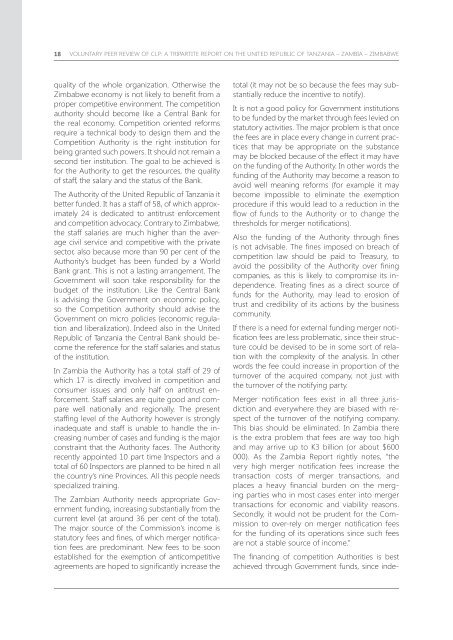a tripartite report - Unctad
a tripartite report - Unctad
a tripartite report - Unctad
Create successful ePaper yourself
Turn your PDF publications into a flip-book with our unique Google optimized e-Paper software.
18 VOLUNTARY PEER REVIEW OF CLP: A TRIPARTITE REPORT ON THE UNITED REPUBLIC OF TANZANIA – ZAMBIA – ZIMBABWE<br />
quality of the whole organization. Otherwise the<br />
<br />
proper competitive environment. The competition<br />
authority should become like a Central Bank for<br />
the real economy. Competition oriented reforms<br />
require a technical body to design them and the<br />
Competition Authority is the right institution for<br />
being granted such powers. It should not remain a<br />
second tier institution. The goal to be achieved is<br />
for the Authority to get the resources, the quality<br />
of staff, the salary and the status of the Bank.<br />
The Authority of the United Republic of Tanzania it<br />
better funded. It has a staff of 58, of which approximately<br />
24 is dedicated to antitrust enforcement<br />
and competition advocacy. Contrary to Zimbabwe,<br />
the staff salaries are much higher than the average<br />
civil service and competitive with the private<br />
sector, also because more than 90 per cent of the<br />
Authority’s budget has been funded by a World<br />
Bank grant. This is not a lasting arrangement. The<br />
Government will soon take responsibility for the<br />
budget of the institution. Like the Central Bank<br />
is advising the Government on economic policy,<br />
so the Competition authority should advise the<br />
Government on micro policies (economic regulation<br />
and liberalization). Indeed also in the United<br />
Republic of Tanzania the Central Bank should become<br />
the reference for the staff salaries and status<br />
of the institution.<br />
In Zambia the Authority has a total staff of 29 of<br />
which 17 is directly involved in competition and<br />
consumer issues and only half on antitrust enforcement.<br />
Staff salaries are quite good and compare<br />
well nationally and regionally. The present<br />
<br />
inadequate and staff is unable to handle the increasing<br />
number of cases and funding is the major<br />
constraint that the Authority faces. The Authority<br />
recently appointed 10 part time Inspectors and a<br />
total of 60 Inspectors are planned to be hired n all<br />
the country’s nine Provinces. All this people needs<br />
specialized training.<br />
The Zambian Authority needs appropriate Government<br />
funding, increasing substantially from the<br />
current level (at around 36 per cent of the total).<br />
The major source of the Commission’s income is<br />
tion<br />
fees are predominant. New fees to be soon<br />
established for the exemption of anticompetitive<br />
<br />
total (it may not be so because the fees may substantially<br />
reduce the incentive to notify).<br />
It is not a good policy for Government institutions<br />
to be funded by the market through fees levied on<br />
statutory activities. The major problem is that once<br />
the fees are in place every change in current practices<br />
that may be appropriate on the substance<br />
may be blocked because of the effect it may have<br />
on the funding of the Authority. In other words the<br />
funding of the Authority may become a reason to<br />
avoid well meaning reforms (for example it may<br />
become impossible to eliminate the exemption<br />
procedure if this would lead to a reduction in the<br />
<br />
<br />
<br />
<br />
competition law should be paid to Treasury, to<br />
<br />
companies, as this is likely to compromise its in-<br />
<br />
funds for the Authority, may lead to erosion of<br />
trust and credibility of its actions by the business<br />
community.<br />
If there is a need for external funding merger noti-<br />
ture<br />
could be devised to be in some sort of relation<br />
with the complexity of the analysis. In other<br />
words the fee could increase in proportion of the<br />
turnover of the acquired company, not just with<br />
the turnover of the notifying party.<br />
diction<br />
and everywhere they are biased with respect<br />
of the turnover of the notifying company.<br />
This bias should be eliminated. In Zambia there<br />
is the extra problem that fees are way too high<br />
<br />
000). As the Zambia Report rightly notes, “the<br />
<br />
transaction costs of merger transactions, and<br />
ing<br />
parties who in most cases enter into merger<br />
transactions for economic and viability reasons.<br />
Secondly, it would not be prudent for the Com-<br />
<br />
for the funding of its operations since such fees<br />
are not a stable source of income.”<br />
<br />
achieved through Government funds, since inde-

















